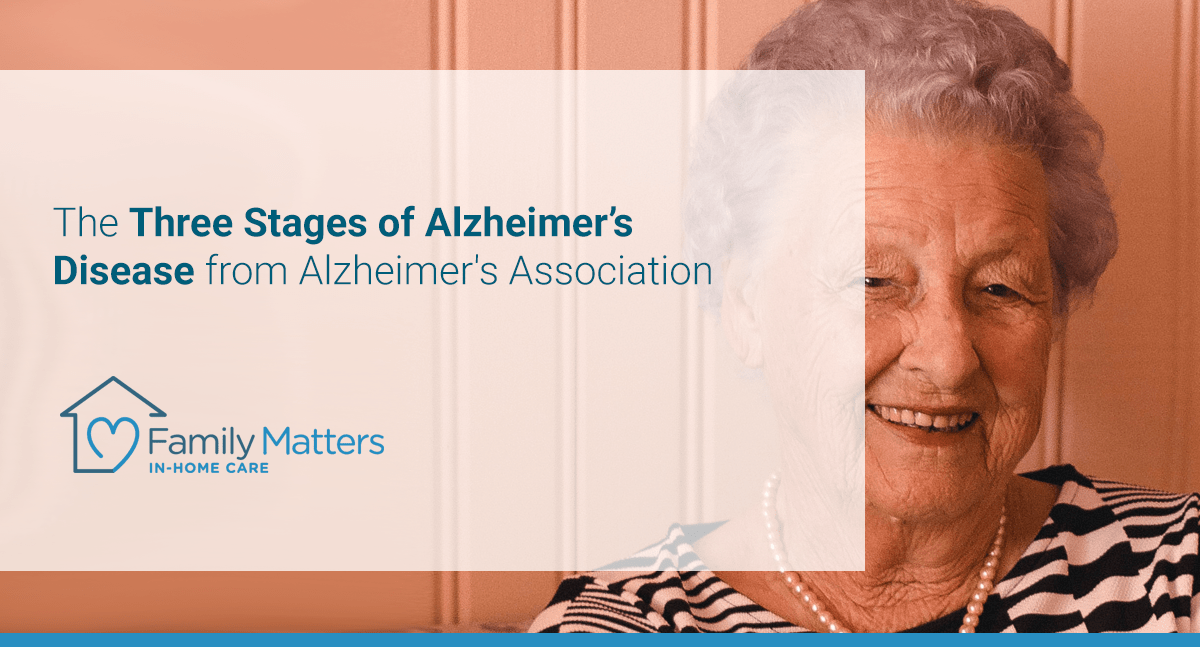
The Three Stages of Alzheimer’s Disease from Alzheimer’s Association
November is National Alzheimer’s Disease Awareness Month. In 1983, when former President Ronald Reagan designated November as National Alzheimer’s Disease Awareness Month, fewer than 2 million Americans had Alzheimer’s. Today, that number has climbed to nearly 5.4 million.
Understand the three stages of Alzheimer’s disease and how caregivers can help patients in each of these different stages.
- Mild Alzheimer’s (early stage)
- Moderate Alzheimer’s (middle stage)
- Severe Alzheimer’s (late stage)
Stage 1. Mild Alzheimer’s (early stage)
In the early stages of Alzheimer’s, friends and family may start to notice their loved one experiencing difficulty remembering things such as familiar words or the location of everyday objects.
Common symptoms of early stage Alzheimer’s include:
- Difficulty finding the right word for something
- Forgetting something they just read
- Not remembering names of people they were just introduced to
- Difficulty performing routine tasks at work or socially
- Losing or misplacing objects
- Trouble planning or organizing
What caregivers can do at early stage Alzheimer’s:
Since the individual is still independent at this stage, a caregiver’s’ role can be to provide support and companionship. The person with Alzheimer’s may need help with things like:
- Appointments
- Managing finances
- Remembering names or words
- Transportation
- Planning and organizing
- Keeping track of medication
It’s important to allow the person to maintain their independence as much as possible and keep communication open for when they do need assistance.
Stage 2. Moderate Alzheimer’s (middle stage)
This is usually the longest stage and individuals can stay in this stage for several years. As the disease progresses, the need and level of care will become greater. People at this stage may start to confuse words, get angry or frustrated or act out in unexpected ways.
Symptoms of Moderate Alzheimer’s will be more noticeable and include:
- Forgetting information such as their own address or telephone number
- Feeling moody or withdrawn, especially in socially or mentally challenging situations
- Changes in sleep patterns
- Forgetting events about their own life
- Being confused on what day it is or where they are
- Needing assistance picking out clothes that are appropriate for the season or occasion
- Urinary and bowel incontinence
- Wandering and getting lost
- Personality and behavioral changes, including suspiciousness and delusions
What caregivers can do at middle stage Alzheimer’s:
Individuals at this stage will require a greater level of care. The person with Alzheimer’s may become frustrated and upset when they have difficulty remembering things and names or trouble with daily activities such as getting dressed. You will most likely have to adjust your daily routine to include more structure for the individual with Alzheimer’s. At this stage caregivers can:
- Use a calm voice when responding to questions to help the person from getting upset or frustrated.
- Respond to the person’s emotion, instead of the question asked. The individual may need reassurance.
- If the individual can still read, write out reminders for them.
Practice patience and sensitivity with patients in this stage. They may become increasingly upset or frustrated as they lose more brain function as well as their independence.
Stage 3. Severe Alzheimer’s (late stage)
In the final stage of Alzheimer’s, personality changes may occur and individuals need increasing help with daily activities. They may still use words or phrases, but communicating emotion becomes difficult.
Symptoms and behaviors of late stage Alzheimer’s may include:
- Changes in physical abilities, including the ability to walk, sit and swallow
- Needing assistance with daily personal care
- Not knowing their surroundings or recalling recent experiences
- Increasingly difficulty communicating
- Vulnerability to infections, particularly pneumonia
What caregivers can do at late stage Alzheimer’s:
Intensive, around-the-clock care is usually required at this stage and can last from several weeks to several years. The role of the caregiver is to preserve the quality of life and dignity for the individual. People in this stage will need help with most activities including eating, dressing, and even walking. At this stage, the world is mainly experienced through the senses. Caregivers can connect and help an individual by:
- Playing his or her favorite music
- Reading excerpts of their favorite books
- Looking at old photos with them
- Preparing a favorite meal
- Brushing the person’s hair
- Sitting outside together
Although an individual in this stage is unable to communicate, research shows that some core of their self may still remain. Caregivers and loved ones may be able to connect on some level even in this stage of the disease.
Please remember that only a doctor can effectively diagnose which stage a person may be experiencing. You can visit (alz.org) for a doctor’s appointment checklist to assist with the evaluation and prepare a caregiver and their loved one with the right questions to be asked.
Additionally, a caregiver can administer the Clock Test or the Mini-Mental State Examination (MMSE) at home to help identify the seriousness of the symptoms prior to a doctor’s appointment.
Home Care services can help help by reminding those with cognitive impairment to take medications, eat, and drive.
If you or your family member is considering in-home care as part of a plan to age in place, contact Family Matters In-Home Care today for a free consultation. Our team is dedicated to supporting your family and helping older adults enjoy life in the comfort of their own home for as long as possible.
Some of the services offered by Family Matter In-Home Care include: Alzheimer’s & Dementia Care, Bed & Wheelchair Transfer Assistance, Companionship, Housekeeping & Meal Preparation, Personal Care, Recovery Care, and Transportation.
Serving the San Francisco Bay Area and Greater San Diego, Family Matter In-Home Care has offices throughout California including: Campbell, CA, Roseville, CA, San Marcos, CA, and San Mateo, CA.
Sources:
- https://cdn2.hubspot.net/hubfs/1708580/Marketing%20Monthlies/PDFs%20from%20Windfarm%20Marketing/1116_Alzheimers-2.pdf
- https://www.alz.org/alzheimers-dementia/stages?type=alzchptfooter
